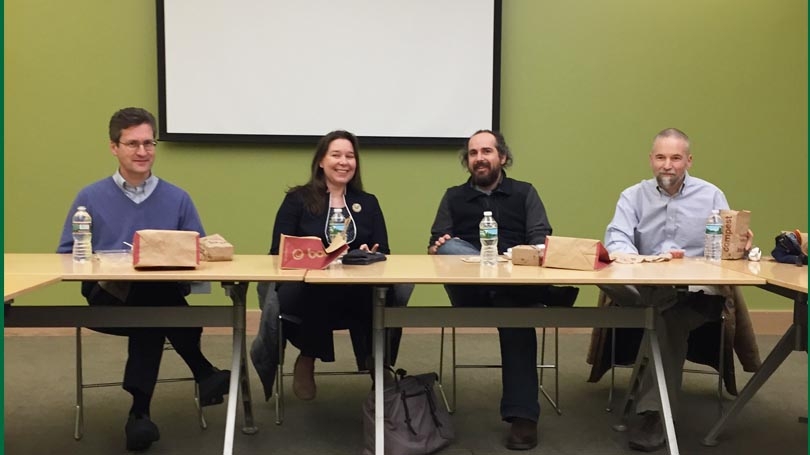
Past winners of the Faculty Mentoring Award formed the panel at one of the sessions (L-R: David Kotz (Computer Science), Margaret Ackerman (Thayer School of Engineering), Ryan Halter (Thayer), Robert Hawley (Earth Sciences)
On Friday, February 3, graduate students lunched with four winners of the Faculty Mentoring Award from the past few years. The Faculty Mentoring Awardees were selected by their students as outstanding mentors. They shared their experiences as mentors to graduate students in their laboratories and their individual approaches to mentoring students.
Each faculty member had different responses to the question: What is your mentoring style, and how involved are you in your mentor-mentee relationship?
Assistant Professor of Earth Sciences, Bob Hawley responded that different students have different mentoring styles and expectations. "I can be hands-on when it comes to mentoring; it works well for me especially with PhD students who have a prearranged mentoring style."
Ryan Halter, who is Assistant Professor at Thayer School of Engineering, added that it gets easier to step back a little once you and your student have established a mentor-mentee relationship that works best for both of you, and especially once your lab grows and your students have good camaraderie.
Bringing in her experience as once a mentee herself, Assistant Professor of Engineering, Margaret Ackerman remembers her appreciation of the freedom she had as a PhD student with a hands-off advisor. "Being direct and upfront with your needs and aspirations with your mentor from the beginning is key because in the end, it is your degree on the line."
David Kotz, Champion International Professor of Computer Science, agreed that every student is different, which was something he as a faculty mentor has learned over the years and has adapted to. One thing that Professor Kotz has kept consistent with all of his students has been to lead each student towards independence so they can come up with solutions to their own problems – in other words, help students take ownership of their research. He added, "I try to remember the big picture. The student and I will need to look at 5-10 years from now and figure out what the student is going to do, so they are prepared for what's ahead after they get their degrees. It's important to start thinking early about where the student wants to go – industry or academia."
When asked what qualities a good mentee carries, they all agreed that the student and the faculty mentor have to be a good fit for one another, and that they preferred working with students who can take charge of their own projects. Halter suggested that not all students are independent but they can become so once you can help guide them towards the direction which will enable them to pursue their interests. Professor Ackerman stressed the importance of professional development, "What I prioritize most in taking students in is how well they can articulate their future interests and how their interests are enabled by working in my group."
Associate Director of the Dartmouth Center for the Advancement of Learning (DCAL), Cynthia Tobery finished off the series with a session on teaching held Friday, February 24. In a three-step process, Tobery discussed teaching through a backward design.
The first step – laying out your goals – should consider important factors such as the backgrounds of the students, prior knowledge students attained or need for your class, and time (how long the course is, how often class meets, etc.).
To help teachers identify what exactly they want to achieve in their classrooms, Tobery suggested using Bloom's Taxonomy, which is a categorization of six measurable goals: remember, understand, apply, analyze, evaluate, and create. An example of a measurable goal is: By the end of the course term, students will be able to understand the processes of rock formation.
To understand if your goals have been met, the second step involves the use of assessments. Formative assessments, such as a pre-course survey and ungraded class assignments, provide the teacher feedback from students about learning. Graded assignments and quizzes are forms of summative assessments which help the teacher understand and make judgement about student achievement. Both forms of assessments provide ways students can let their teacher know if the teaching style is effective or not, and what the teacher can do next time to improve teaching and increase student achievement.
The third step involves setting up activities to achieve teaching goals and improve student learning. Tobery emphasized active activities over those that are passive, in that active and engaged activities are more effective in getting students to think about the topic at hand. Asking students to draw conclusions from a given data is an active form of simply stating, "Based on this data, the conclusions drawn were...".
Finally, Tobery advised those who wish to become teachers to use resources at their institutions to learn effective teaching methods. Resources at Dartmouth include DCAL, EdTech, and librarians.
The teaching workshop wrapped up this term's "Becoming Faculty" series organized by Assistant Dean of Graduate Student Affairs, Kerry Landers. Landers created the series to help guide current graduate students and postdocs at Dartmouth towards a career in teaching, particularly at the college/university level. Graduate faculty shared their experiences from when they first decided to teach, and offered advice from how to give an effective research talk to the do's and don'ts of faculty interviews.
Other topics in the series included how to enhance the visibility and impact of graduate research, getting and negotiating an academic job offer, and research lab management. Please check the LibCal Calendar site for future graduate workshops and keep an eye on the ListServ emails from Kerry Landers!